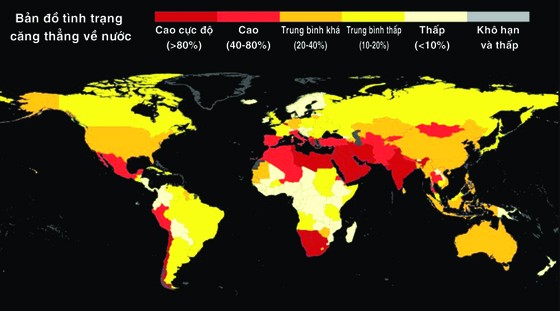SGGP
The World Resources Institute (WRI) has just released a report stating that about half of the world's population is facing high water stress for at least one month a year. Water shortages are expected to get worse.
 |
The World Resources Institute, which studies issues related to natural resources and the environment, has collaborated with Aqueduct, a program supported by a coalition of research centers, universities, governments and businesses, to publish maps showing current and future water shortages. According to the analysis by WRI and Aqueduct, based on data from 1979 to 2019, the proportion of the population affected could increase to nearly 60% by 2050.
“High stress” means that at least 60% of available water resources have been used, leading to local competition between different users. Twenty-five countries are currently facing “extremely high” levels of water stress, meaning that the imbalance between their water use and their water reserves is at least 80%. Some countries, such as Bahrain, Cyprus, Kuwait, Lebanon, Oman, Chile… are facing the most severe situation. An additional 1 billion people are predicted to be living in extremely high water stress conditions by mid-century. “Our analysis only shows long-term trends and averages. It does not account for peaks that can have worse, more localized consequences,” cautions Samantha Kuzma, data management and geospatial specialist for Aqueduct and WRI.
WRI’s water allocation forecast map also highlights the threat to food security, with 60% of irrigated crops threatened by extremely high water stress.
According to WRI, about 31% of the world's GDP could suffer from high or very high water stress by 2050, compared with 24% in 2010.
Globally, water demand has been increasing steadily (doubling since 1960) due to the boom in irrigated agriculture , growing demand for energy production, industry and population growth.
In fact, the rate of increase in water demand is even faster than the rate of global population growth, especially in developing countries.
According to researchers, the natural water cycle is changing, causing heavy rains and extreme droughts. As a resource, water is becoming more scarce as humans and most living things in nature need it more as heat waves become more intense.
Therefore, WRI asserts that the world is facing an unprecedented water crisis, exacerbated by climate change. The authors of the report argue that limiting the impact of the water crisis will not cost much, provided that water management is improved. They estimate the budget needed to overcome the chronic lack of investment in infrastructure, change irrigation patterns, focus on developing nature-based solutions, etc.
Source


![[Photo] General Secretary To Lam chairs the meeting of the Central Steering Committee on preventing and combating corruption, waste and negativity](https://vphoto.vietnam.vn/thumb/1200x675/vietnam/resource/IMAGE/2025/9/29/fb2a8712315d4213a16322588c57b975)


































































































Comment (0)